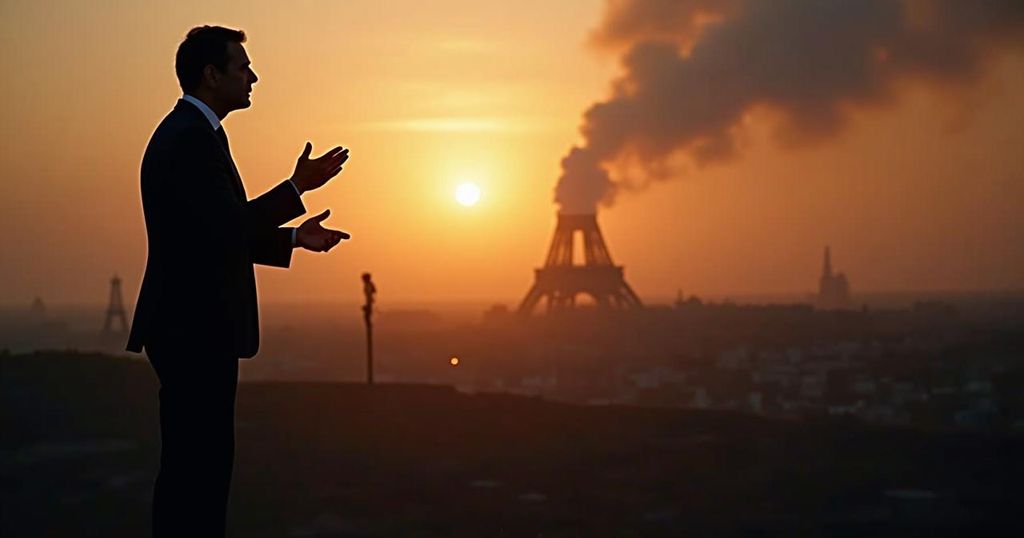Macron Calls for Arms Embargo on Israel Amid Ongoing Conflict
French President Emmanuel Macron has called for a suspension of arms deliveries to Israel amidst ongoing conflict in Gaza, leading to a harsh rebuttal from Israeli Prime Minister Benjamin Netanyahu. Macron stressed the need for a political solution and expressed concerns over the potential escalation in Lebanon. Netanyahu defended Israel’s military actions and criticized Western leaders for endorsing arms embargoes against Israel.
On Saturday, French President Emmanuel Macron called for an immediate halt on arms deliveries to Israel intended for use in Gaza, a request that has incited a fierce backlash from Israeli Prime Minister Benjamin Netanyahu. Macron emphasized the necessity of returning to a political resolution, asserting, “I think that today, the priority is that we return to a political solution, that we stop delivering weapons to fight in Gaza,” during an interview with French broadcaster France Inter. He highlighted his ongoing alarm regarding the escalating conflict in Gaza, which has persisted despite numerous calls for a cease-fire, stating, “I think we are not being heard. I think it is a mistake, including for the security of Israel,” noting that the situation is engendering increased animosity. In response, Netanyahu issued a strong retort, stating, “As Israel fights the forces of barbarism led by Iran, all civilized countries should be standing firmly by Israel’s side. Yet, President Macron and other Western leaders are now calling for arms embargoes against Israel. Shame on them.” He criticized the inconsistency of this stance given the support Iran provides to armed groups such as Hezbollah, Hamas, and the Houthis. Netanyahu claimed, “This axis of terror stands together. But countries who supposedly oppose this terror axis call for an arms embargo on Israel. What a disgrace!” He confidently asserted Israel’s resolve, saying, “Rest assured, Israel will fight until the battle is won — for our sake and for the sake of peace and security in the world.” During the interview, Macron expressed concerns over the potential escalation of conflict in Lebanon, emphasizing, “Lebanon cannot become a new Gaza,” and reasserted his disappointment in Netanyahu’s order to deploy ground troops in Lebanese territory. He noted that the International Organization of La Francophonie, comprising 88 member states including France and Canada, has urged for an “immediate and lasting” cease-fire in Lebanon. Macron reiterated France’s recognition of Israel’s right to defend itself, announcing a meeting on Monday with families of Franco-Israelis held hostage in Gaza, as the anniversary of the October 7 Hamas attack approaches, which has catalyzed the ongoing conflict in Gaza and now Lebanon. The ongoing hostilities have resulted in catastrophic human tolls. Israeli defense forces have inflicted heavy casualties in Gaza, with reports indicating over 41,825 deaths, predominantly civilians, while the October 7 attack led to 1,205 casualties within Israel, mainly among civilians. The international community continues to grapple with the repercussions of these escalating tensions and the urgent need for a resolution.
The geopolitical landscape surrounding the Israeli-Palestinian conflict has been marked by tension, particularly with the recent escalation in violence following the October 7 Hamas attack on Israel. The ensuing conflict has resulted in a significant humanitarian crisis, leading to substantial loss of life on both sides. President Macron’s call for an arms embargo against Israel highlights a growing division within the international community regarding support for Israel’s military actions in response to Hamas. Macron’s stance reflects a broader concern for preserving regional stability, particularly in Lebanon, which risks becoming overshadowed by the Gaza conflict. Netanyahu’s response underscores the perception of Israel’s battle as one against terrorism backed by Iran, complicating diplomatic discourse around arms support and military strategies in the region.
In summary, President Macron’s recent call for halting arms shipments to Israel has opened a new chapter in the international dialogue regarding the ongoing conflict in Gaza and Lebanon. His stance reflects both a commitment to peace and a desire to avert further escalation, while Netanyahu’s rebuttal emphasizes a narrative of self-defense against terrorism. The situation remains volatile, and the outcome of these diplomatic exchanges could profoundly impact the broader regional landscape.
Original Source: www.voanews.com




Post Comment